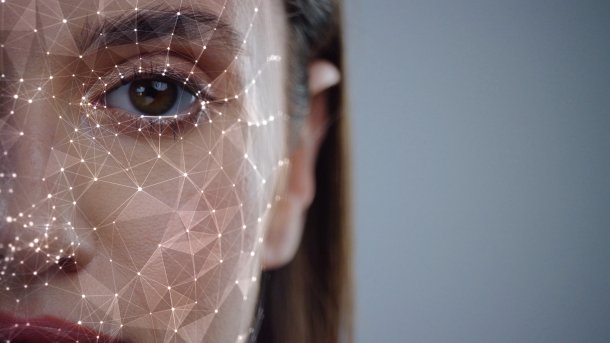Saxony and Berlin: Police surveillance with real-time facial recognition
A powerful surveillance system records license plate numbers and facial images of drivers and compares them with a wanted persons database.

Saxony and Berlin use facial recognition.
(Image: Fractal Pictures/Shutterstock.com)
The police in Saxony have had a secret surveillance system developed with high-resolution video cameras and biometric facial recognition that works virtually in real time. This is now being used not only in Saxony, particularly in areas close to the border, but also in Berlin. "Facial recognition software has been used by the Berlin public prosecutor's office in two sets of proceedings in the area of cross-border gang crime," explained the Berlin Senate Department for Internal Affairs at the beginning of March in response to a question from the AfD parliamentary group in the House of Representatives. "The deployment was carried out using material and personnel resources that were made available as administrative assistance." As has now emerged, the biometric comparison with search files is carried out almost live.
For the investigations in Berlin, the Saxon State Criminal Police Office (LKA) submitted a request for administrative assistance to the public prosecutor's office in the capital via its regional office in Görlitz. According to the Netzpolitik.org portal, this was confirmed by the Berlin Ministry of the Interior in response to a corresponding question from Left Party MP Niklas Schrader. The surveillance system, which Saxony is said to have classified as secret, records license plates of passing vehicles as well as facial images of drivers and passengers. The system can process facial images "with a time delay of a few seconds", the Berlin public prosecutor's office had previously told Neues Deutschland (ND). All persons recorded in the vicinity would be compared with images of suspects from a specific investigation. If the software detects a suspicious person, a police officer will check the image.
The system has high-resolution cameras "that can produce very good quality images even in the dark and in poor weather conditions", the Berlin Senate of the Interior has now explained, according to the report. One case is being investigated for an "international vehicle transfer", the other for aggravated robbery at a petrol station. This crime is being charged to an organization that "regularly carries out gang-related serious thefts from safes" at relevant fuel supply facilities. The technology is apparently based on the Personal Identification System (PerIS) developed for the Saxon police. This has been used in the state since 2019/20. Interior Minister Armin Schuster (CDU) praised the end of 2023: He was not aware of any comparably powerful system "at least in Europe to date".
Videos by heise
Real-time facial recognition is particularly controversial
Live facial recognition was long considered a particularly hot topic in the negotiations on the EU's new AI regulation. The EU Parliament initially called for a ban on biometric mass surveillance, but the member states did not want to hear about it. The final version stipulates that real-time identification should be possible "for a limited time and place" for the targeted search for victims of kidnapping, human trafficking and sexual exploitation or to prevent "a specific and present terrorist threat". Another purpose mentioned is the localization or identification of a person suspected of having committed a series of serious crimes.
The Berlin Senate of the Interior cites Section 98a of the Code of Criminal Procedure (StPO) as the legal basis for the biometric data comparison. This concerns dragnet searches in the case of a criminal offense of major significance, if other methods were considerably less promising or much more difficult. The public prosecutor's office in the capital does not consider the surveillance to be "comprehensive surveillance". According to Frankfurt criminal law expert Tobias Singelnstein, Netzpolitik.org disagrees: "Such a measure interferes to a considerable extent with the rights of completely uninvolved parties because, depending on the circumstances, many people are recorded." The StPO does not allow this. Schrader also complains: "By borrowing the relevant technology from Saxony", Berlin is gradually creating the conditions to use it across the board.
(anw)